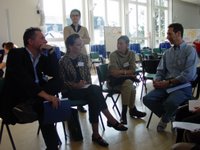What happened to the LO-lads?
At some point, AT retired and then became ill, as I understand it. When his participation dropped off, so did the list's activity. I tried to follow up with him afterwards, but his email no longer worked.
While AT wrote long posts, he did hold discussions, not monologs; there were quite a number of active participants. Jan, I think you were a key discussant regarding the 7Es.
I think there are two lessons for facilitation. First, if you have the chance to study the 7Es, I think you'll find them beneficial. Even though I don't know them well, I find them helpful.
Second, when we're running a discussion list such as this, I do think we need to pay attention to the diversity of ideas and the ongoing sustainability of the list. If it gets too one-dimensional (even on as rich a dimension as the 7Es), it risks a sudden demise if a key player goes away.
To tie this back to Jan's idea, I think Rick Karash, the LO host, might have worked to facilitate renewed discussion if there hadn't been the vendor and SPAM issues. Rick spent significant time almost every day manually editing and moderating a huge volume of posts (GRP-FACL list volume is, IIRC, a mere tiny fraction of the LO volume in its heyday), and, after nine years or so, I'm sure it got to be a burden.
Rick and AT both deserve a lot of credit. Rick started one of the first major, successful, non-techie mailing lists (1994?), and that work was written up in Fortune or Forbes or some such magazine. AT developed a powerful and comprehensive theory, and he seemed to apply it throughout his life's work. I suspect a number of people here were at least lurkers on the LO list, for it had broad participation.
Bill
- --
Bill Harris http://facilitatedsystems.com/weblog/
Facilitated Systems Everett, WA 98208 USA
http://facilitatedsystems.com/ phone: +1 425 337-5541


